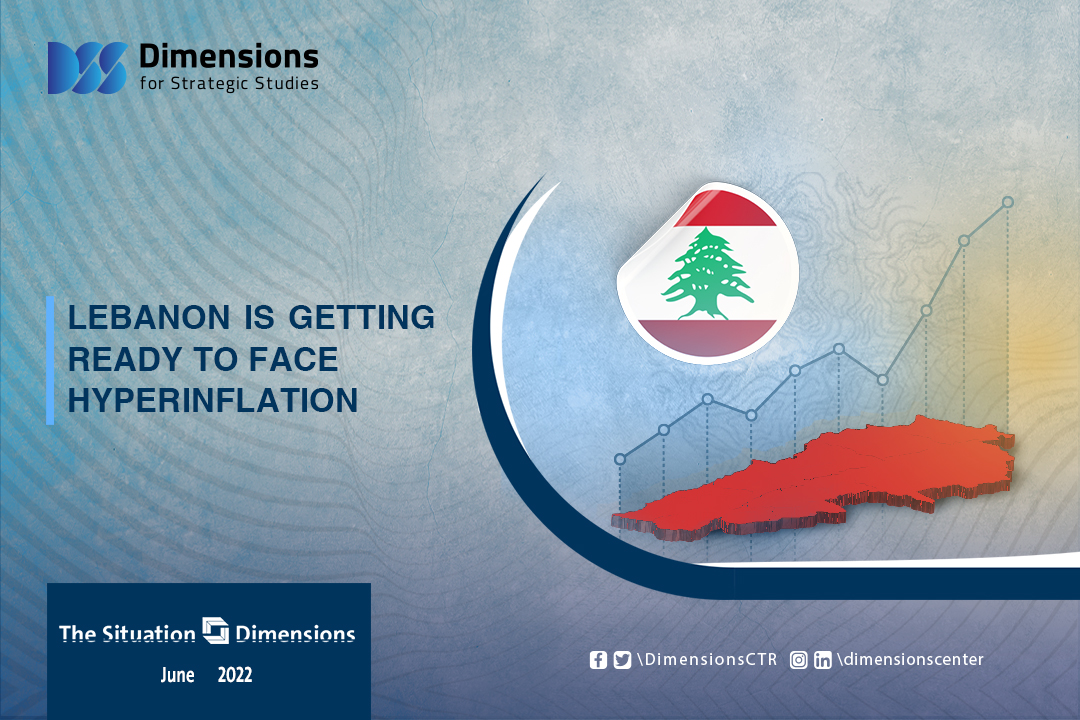
LEBANON IS GETTING READY TO FACE HYPERINFLATION
2022-06-271990 view
The Lebanese people are experiencing economic hardship, as the economic crisis in the country is worsening day after day. This left citizens anxious, anticipating new decisions or measures that may make their living worse. The Lebanese attention is focus on the prices of fuels, by which the prices of various commodities and transportation costs are affected. If prices are out of control, the inflation rates will double.
All sorts of subsidies have gradually deteriorated on primary and secondary commodities. What remains of subsidies are quite limited but essential as the case in fuel and flour.
Lebanon's Central Banak (Banque du Liban/BDL) spends about $150 million a month on fuel imports, which prompted the governor, Riad Salameh, to inform the executive authorities: the President, the Prime Minister and the Minister of Energy that he is unable to continue following the policy of providing dollars for imported fuel. Salameh also told the executive authorities that it was necessary for prices to be not linked with the price set by the “Sayrafa exchange platform”, which is a platform supported by the Banque du Liban, through commercial banks. With the help of Sayrafa the US dollar can be purchased at a price lower than black market one (the US dollar on this platform is about 25,000 LBP). Consequently, this matter will price the imported fuels in light of the dollar price in the black market, i.e., about 29,000 LBP. This means that the price of a gallon of fuel will start at 800,000 LBP and up.
This decision taken by Salameh on which he will press firmly for implementation in the coming days, had repeatedly postponed due to political pressures on one side and expectations on the other, with aim at calming the street down and control the exchange rate. Such pressures were either through economic tricks or manipulating the supply and demand, withdrawing sums of LBP and pumping dollars in the market. However, the Governor’s forward escape strategy is no longer sufficient, especially in light of the complete absence of the government, the lack of vision or solutions, and amid uncertain political decisions.
This decision, if taken, will have catastrophic repercussions on the market and on the Lebanese population's livelihood, as the price of a gallon of gasoline (20 liters) may exceed one million LBP. In such a situation, the owners of the gas stations will rush to the black market to buy the US dollar, which in turn increase demand for the dollar and its value in exchange for a deterioration of the value of the LBP. This will multiply the price of a gallon of gas in the medium term; first because of the direct connection of its price with the black market dolla. The other reason is that the value of the LBP will deteriorate by time.
This multiple effect will not be limited in consequences, as inflation will affect the prices of all commodities, due to the deterioration in the price of the lira and the increase in the cost of transportation, which will be in line with the high cost of fuel, despite the fact that most wages remain the same.
Removing subsidies will not be the only reason for inflation; the thing that would result in high inflation rates. The global crisis caused by Russia's invasion of Ukraine will not excluded Lebanon from the international increase in oil and other basic commodities.
Parallel to that, the Lebanese state’s resources are limited, and cannot bring in more money in the foreseeable future, given the impossibility of increasing taxes on citizens, especially since salaries remain unchanged. Moreover, the government must amend laws and launch projects, if it wants to attract foreign investments. The government is still far away from that at present. As for the International Monetary Fund, it will not grant the Lebanese state any loans before implementing the required reforms. Lebanon will not neither get any aid from Arab or Western countries due to the uncertainty it is going through.
Today, the Lebanese state relies almost entirely on manipulating the supply and demand equation on the one hand, and the billions of dollars which are expected to come from tourism during the next summer on the other.
The political uncertainty that Lebanon is facing will make any government unable to take decisions, attract investments, or introduce resources and hard currencies into the country, as citizens are experiencing the negative effects of this situation. This will be added to fears that the expected tourism money may be lost in the central bank's black hole, because the BDL is working on withdrawing the US dollar from the market to be added to its own foreign currencies’ reserve. Such a tactic of sucking the dollar from the market and storing it helps the Lebanese state but not people by injecting it with survival serum.





